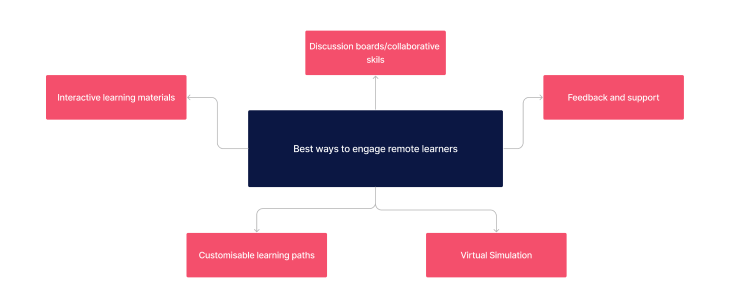What is Remote Learning?
Remote learning, or distance education, has transformed the landscape of educational delivery. It's a teaching model where instructors and learners are separated by physical distance and technology is used to bridge the instructional gap. This approach has become increasingly prevalent, especially in a world adapting to the challenges posed by global events such as pandemics. Remote learning encompasses a variety of formats - from online courses and video lectures to interactive learning experiences. This modality of learning is characterised by its flexibility, accessibility, and use of digital platforms, making education reachable to a wider audience.
What is Remote Learning in Healthcare?
Remote learning in the healthcare sector specifically addresses the educational needs of healthcare professionals and staff. This includes training in areas such as primary care, urgent care, mental health, and aged care. The healthcare system continually evolves, requiring ongoing education and professional development to ensure that health services are delivered effectively and safely. Remote learning in healthcare can range from formal degree programs to short courses and workshops focused on specific health topics or skills. It's an essential tool for continuous learning, enabling healthcare professionals to stay up-to-date with the latest medical knowledge and practices while balancing their demanding work schedules.
Best Ways to Engage Remote Learners in Healthcare

Engaging remote learners in the healthcare sector presents unique challenges and opportunities. The dynamics of healthcare education require a blend of theory and practice, making engagement not just a matter of content delivery but also of practical application. In this section, we will explore several key strategies that have proven effective in capturing and maintaining the interest of remote learners in the healthcare field.
- Interactive Learning Materials: Utilising multimedia content, interactive modules, and real-life case studies can significantly enhance the learning experience. Interactive e-books, videos, and quizzes help in breaking the monotony of traditional text-based learning, making education more engaging.
- Discussion Boards and Collaborative Tools: Platforms for discussion and collaboration foster a sense of community. Online forums, chat groups, and video conferencing tools enable learners to interact with peers and educators, enhancing knowledge sharing and peer-to-peer learning.
- Regular Feedback and Support: Providing timely, constructive feedback and support is crucial. This can be achieved through regular online office hours, feedback sessions, and responsive communication channels.
- Virtual Simulation and Practical Training: Implementing virtual simulations and offering practical training sessions online can provide hands-on experience in a virtual environment. This is particularly important for healthcare training where practical skills are essential.
- Customisable Learning Paths: Allowing learners to choose their learning paths and specialise in areas of interest caters to individual learning styles and career goals, thereby increasing engagement.
Is Remote Learning Effective?
The effectiveness of remote learning has been a subject of debate, especially in the context of healthcare education. Studies indicate that when designed and implemented correctly, remote learning can be as effective as traditional classroom settings. Key elements contributing to its effectiveness include well-structured content, interactive and immersive learning experiences, and the ability to provide real-time feedback. Remote learning offers flexibility and a personalised learning environment, which can lead to improved learning outcomes for diverse groups of learners. However, its success heavily depends on the quality of the learning materials, the technology used, and the level of support provided to the learners.
Want a healthcare LMS that can support remote learning engagement?
Contact Ausmed today and see how we can support your organisation!
Pros and Cons of Remote Learning in Healthcare
While remote learning offers numerous benefits, it also comes with its own set of challenges, particularly in the healthcare education context. Understanding these pros and cons is crucial for educators and institutions to effectively adapt their teaching methodologies. The following table provides a succinct overview of the advantages and disadvantages associated with remote learning in healthcare.
| Pros | Cons |
|---|---|
| Flexibility and convenience | Possible lack of hands-on experience |
| Access to a wide range of resources | Requirement of self-discipline and motivation |
| Customisable learning experiences | Potential for limited social interaction |
| Opportunities for global collaboration | Dependence on technology and stable internet connection |
| Cost-effective for both learners and institutions | Challenges in measuring learning outcomes |
Related Resources
- LMS in Healthcare: The Roles, Benefits and Pros and Cons
- A Guide to Self-Directed Learning
- How Can I Implement Self-Directed Learning Strategies?
- How to Create a Culture of Continuous Learning
- How to Manage an Effective Staff Training Program
- Identifying Skills Gaps with Learning Analytics
- A Guide to Personalised Learning in Healthcare
- What Are the Benefits of Blended Learning in Healthcare?
Conclusion
Remote learning in healthcare is a dynamic and evolving field, offering numerous opportunities for engaging and effective education. It plays a crucial role in professional development and lifelong learning for healthcare professionals. While it comes with its set of challenges, the advantages it offers in terms of accessibility, flexibility, and the range of learning experiences make it an invaluable component of modern healthcare education. As technology advances and our understanding of effective online teaching methods improves, remote learning will continue to shape the future of education in the healthcare sector.
References
- World Economic Forum. (2020). Coronavirus education: Learning and teaching has changed. Here's what we know. Available at: https://www.weforum.org/agenda/2020/04/coronavirus-education-global-covid19-online-digital-learning/.
- NCBI. (n.d.). Several studies have attempted to measure the effects of e‐learning in medical practice. Available at: https://www.ncbi.nlm.nih.gov/.
- NCBI. (n.d.). Remote Teaching Due to COVID-19: An Exploration of Its Effectiveness. Available at: https://www.ncbi.nlm.nih.gov/.
- eSoftSkills. (n.d.). Ensuring Engagement and Effectiveness in Remote Healthcare Training Sessions. Available at: https://esoftskills.com/.
- D2L. (n.d.). 4 Best Practices for Clinical Online Education. Available at: https://www.d2l.com/.



